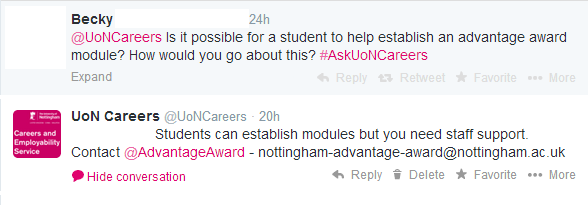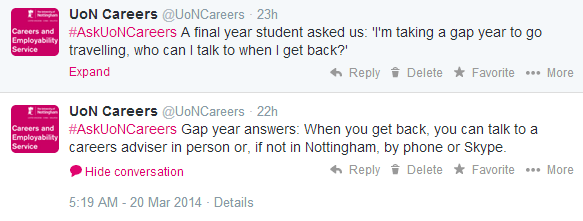
March 21, 2014, by Beth Dawson
Online Q&A round-up part 2
By Paul Charman, Careers Consultant
Missed this week’s Q&A? Get up-to-speed with a selection of questions we received and advice given. You may find the answers to a careers question you’ve been wanting to ask here!
When’s the best time to apply for internships, first or second year? (Kathryn, first year studying human genetics)
Why not both? Increasingly we are finding employers offering more internship and work experience opportunities to first-year students.
A lot of the opportunities for first years will be spring weeks or insight days – take a look on MyCareer. They also allow you to explore sectors and companies in more detail before applying for second-year internships.
Second-year internships tend to be more intensive and usually take place over the summer vacation period. Application timetables can be similar to graduate applications, so be specific about what sector or roles you’re looking for and start your search early. Increasingly, internships are a great way to secure a graduate job, so are well worth looking at. Getting experience in your first year could really strengthen future applications and help you decide what’s best for you!
How can I make my application stand out from the crowd? (Classics student)
It is vital that there are no errors in your application, so allocate enough time and proof read it thoroughly. Employers often ask about your career motivations, so research the organisation and sector to ensure that your interest in them shines through. If you have attended a presentation or completed an insight day, make sure that this is noted and try to write the application as if this is the only organisation you are applying to!
You might also be asked some competency-based questions about teamwork, leadership or problem solving . Use the STAR technique to outline the Situation, Task, Action and Result of your experiences and try to use examples from different parts of your life, as well as your academic studies.
How can I find out more about the links that The University of Nottingham has with financial firms (Charlotte, studying economics)
The first place I would recommend to look is MyCareer, which contains a database of companies that have previously worked with the University of Nottingham. Here you can search for vacancies and employers by sector.
There is a strong presence of financial firms on the system, so it’s well worth a look. You can also find the events we’re running with employers on My Career. If you haven’t already, you might want to consider joining relevant societies.
I’m confused about what I can do with my politics degree? (Tamara, year 2)
The good news is that your politics degree sets you up for a wide variety of careers, but I guess the flipside is lots of options can make life confusing.
Looking at the employment destinations of our politics and international relations 2012 graduates, these are the most common sectors:
- public sector administration
- accountancy and financial management
- public relations and political lobbying
- political and social science research
- marketing and sales management
You can explore further careers that politics and international relations students have gone into on our website and Prospects’ options for your subject pages.
Some politics students go into postgraduate study such as masters courses associated with politics and international relations, legal training or teaching qualifications. I would recommend booking an appointment with a careers adviser to explore your options further.
If you have a question you’d like to put to one of our careers advisers, we’re holding two more online Q&A sessions on 27 March and 3 April. Tweet your question to #AskUoNCareers. Want to speak to a careers adviser in person? You can book an appointment through MyCareer.
No comments yet, fill out a comment to be the first




Leave a Reply